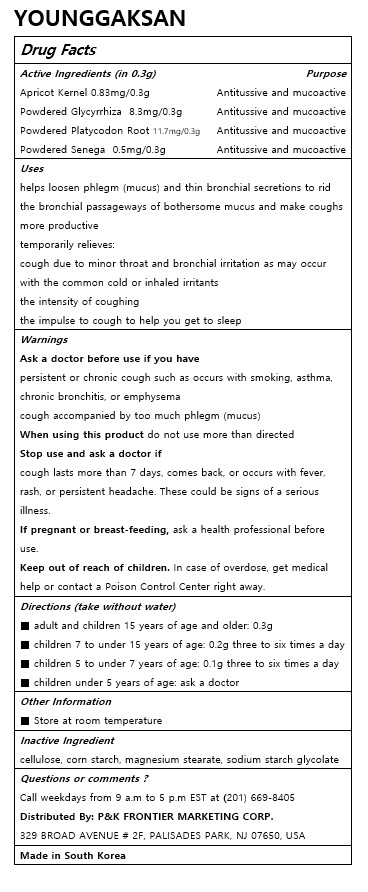Younggaksan | Apricot Kernel, Powdered Glycyrrhiza, Powdered Platycodon Root, Powdered Senega Powder while Breastfeeding

What is Younggaksan | Apricot Kernel, Powdered Glycyrrhiza, Powdered Platycodon Root, Powdered Senega Powder ?
Purpose: Helps loosen phlegm (mucus) and thin bronchial secretions to rid the bronchial passageways of bothersome mucus and make coughs more productive temporarily relieves: cough due to minor throat and bronchial irritation as may occur with the common cold or inhaled irritants the intensity of coughing the impulse to cough to help you get to sleep
Younggaksan | Apricot Kernel, Powdered Glycyrrhiza, Powdered Platycodon Root, Powdered Senega Powder safe in breastfeeding?
Younggaksan | Apricot Kernel, Powdered Glycyrrhiza, Powdered Platycodon Root, Powdered Senega Powder Breastfeeding Analsys
Glycyrrhizin while Breastfeeding
UnsafeCAS Number: 1405-86-3
Root of leguminous herb is used. Content: essential oil, flavonoids, tannins, saponins, hydroxi-coumarins.... Unproven effects: anti-ulcerative and expectorant. Indication after Commission E of German Ministry of Health: gastritis, gastric ulcer, cough, bronchitis. Because of mineralocorticoid effects, Pseudoaldosteronism, Hypokalemic palsy, Hypernatremia, Edema, Heart arrhythmias and Arterial Hypertension, a longstanding use or abuse of licorice may be a cause of severe health disorders. May be a cause of abortion and premature labor if taken while pregnancy. Since it has anti-prolactin and estrogenic effects, decrease of milk production can occur within the first weeks after birth. Reportedly, one case of hyperprolactinemia has occurred. There is no proof on its galactagogue effect. Glycyrrhizin is responsible of many effects of Licorice which is excreted in small amount into breast milk. Two infants younger than one months were severely intoxicated (lethargy) after their mothers had drunk an daily average of 2 liters of a beverage containing a mixture of Licorice, Fennel, Anise and Goat's rue. It was assumed to be related to anethol contained in the fennel and anise.
Younggaksan | Apricot Kernel, Powdered Glycyrrhiza, Powdered Platycodon Root, Powdered Senega Powder Breastfeeding Analsys - 2
Glycyrrhizin while Breastfeeding
CAS Number: 84775-66-6
Licorice (Glycyrrhiza glabra) root contains glycyrrhizin (also called glycyrrhizic acid or glycyrrhizinic acid) and a mixture of the potassium and calcium salts of glycyrrhizic acid. Glycyrrhizin is metabolized to the active glycyrrhetinic acid in the intestine. Deglycyrrhizinated licorice (DGL) has had glycyrrhizin removed. Licorice is a purported galactogogue, and is included in some Asian proprietary mixtures to increase milk supply; however, no scientifically valid clinical trials support this use. In fact, licorice usually reduces serum prolactin,[1] which might decrease milk production in the early stages of lactation. Women taking licorice have experienced elevated blood presure.[2] Galactogogues should never replace evaluation and counseling on modifiable factors that affect milk production.[3] Glycyrrhizin is detectable in the breastmilk of some women taking licorice, but studies measuring glycyrrhetinic acid have not been performed. Licorice has been used safely and effectively in combination with other herbs given to infants as a tea for the short-term treatment of colic.[4] However, two infants whose mothers had an excessive intake of an herbal tea that contained licorice had signs of anethole toxicity.[5] Because both of these papers reported on herbal mixtures, the effect(s) of licorice alone cannot be determined. Licorice and licorice extract are "generally recognized as safe" (GRAS) as foods by the U.S. Food and Drug Administration. Long-term, excessive use of licorice can cause hypertension, hypokalemia, and disturbances of adrenal hormones, and therefore should probably be avoided during nursing. Dietary supplements do not require extensive pre-marketing approval from the U.S. Food and Drug Administration. Manufacturers are responsible to ensure the safety, but do not need to the safety and effectiveness of dietary supplements before they are marketed. Dietary supplements may contain multiple ingredients, and differences are often found between labeled and actual ingredients or their amounts. A manufacturer may contract with an independent organization to verify the quality of a product or its ingredients, but that does certify the safety or effectiveness of a product. Because of the above issues, clinical testing results on one product may not be applicable to other products. More detailed information #about dietary supplements# is available elsewhere on the LactMed Web site.
What should I do if already breastfed my kid after using Younggaksan | Apricot Kernel, Powdered Glycyrrhiza, Powdered Platycodon Root, Powdered Senega Powder?
Not much study has been done on safety of Younggaksan | Apricot Kernel, Powdered Glycyrrhiza, Powdered Platycodon Root, Powdered Senega Powder in breastfeeding and its ingredients. Even we do not have complete information about usage of Younggaksan | Apricot Kernel, Powdered Glycyrrhiza, Powdered Platycodon Root, Powdered Senega Powder in breastfeeding so at this point a trained medical professional could be your best bet. If you observe anything abnormal with your baby please contact 911.
My doctor has prescribed me Younggaksan | Apricot Kernel, Powdered Glycyrrhiza, Powdered Platycodon Root, Powdered Senega Powder, what should I do?
If your doctor considers Younggaksan | Apricot Kernel, Powdered Glycyrrhiza, Powdered Platycodon Root, Powdered Senega Powder safe enough to prescribe for you that means its benefits should outweigh its known risks for you.
If I am using Younggaksan | Apricot Kernel, Powdered Glycyrrhiza, Powdered Platycodon Root, Powdered Senega Powder, will my baby need extra monitoring?
We are not Sure, Please check with your healthcare provider or doctor.
Who can I talk to if I have questions about usage of Younggaksan | Apricot Kernel, Powdered Glycyrrhiza, Powdered Platycodon Root, Powdered Senega Powder in breastfeeding?
US
National Womens Health and Breastfeeding Helpline: 800-994-9662 (TDD 888-220-5446) 9 a.m. and 6 p.m. ET, Monday through Friday
UK
National Breastfeeding Helpline: 0300-100-0212 9.30am to 9.30pm, daily
Association of Breastfeeding Mothers: 0300-330-5453
La Leche League: 0345-120-2918
The Breastfeeding Network supporter line in Bengali and Sylheti: 0300-456-2421
National Childbirth Trust (NCT): 0300-330-0700
Australia
National Breastfeeding Helpline: 1800-686-268 24 hours a day, 7 days a week
Canada
Telehealth Ontario for breastfeeding: 1-866-797-0000 24 hours a day, 7 days a week
